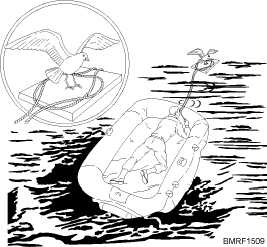specially designed to maintain your physical and mental
abilities and aren’t thirst-provoking. The ration is based
on an allowance of one packet per person per day; but,
you should eat only when you feel the greatest need.
Don’t take any food or water the first 24 hours. Food is
much less important for survival than water. With water,
a person can survive for 4 weeks or longer without food.
Nearly all forms of sea life are edible. Some fish are
poisonous; for example, jellyfish (which you should
never eat). Each lifeboat has a fishing kit for catching
fish.
All sea birds are edible, and practically the entire
bird is useful. In addition to the food and liquid obtained
from sea birds, you can fashion fishhooks and lures
from the bones and feathers. In cold weather, a bird’s
skin (with feathers) will protect exposed parts of your
body.
Birds sometimes settle on the raft or boat, and
survivors have reported instances where birds landed on
their shoulders. If birds are shy, try dragging a baited
hook through the water or throwing a baited hook into
the air.
You can catch gulls, terns, gannets, and albatrosses
by dragging a baited hook behind the boat or raft. You
can attract them within shooting distance by dragging a
bright piece of metal or shell behind the raft. It’s
possible to catch a bird if it lands within reach. Most
birds, however, are shy and will settle on the raft out of
reach. In that case, try a bird noose. Make it by tying a
loose knot with two pieces of line, as shown in figure
15-9. Bait the center of the loop with fish entrails or
similar bait. When the bird settles in the loop to eat the
bait, tighten the noose around its feet.
The North Atlantic and the North Pacific have
relatively few birds, and these are found mostly along
the coasts. You may see many species of birds, often
hundreds of miles from land, in southern waters.
Exposure
Exposure presents many dangers. Some dangers
include sunburn, hypothermia, frostbite, and immersion
foot. Some actions you can take to survive these
conditions are as follows:
MAN OVERBOARD
All the information in this section applies mainly to
ship disasters when your ship is sunk. Such events
normally occur in wartime but rarely in peacetime.
However, a mishap that can happen to you at any time,
and usually without warning, is to fall overboard. One
minute you are walking along the main deck; the next
15-12
Student Notes:
Figure 15-9.—Bird noose.
CONDITION
ACTION
Cold
You can’t survive for any great length of time in cold water without a special exposure suit.
In water cooler than 75E F, you face a serious condition called hypothermia. Hypothermia
occurs when your body is exposed to subnormal temperatures. To overcome hypothermia,
minimize heat loss from your head, neck, sides, and groin. Raise as much of your body as
possible out of the water; wear a hat; and assume the fetal position or huddle in close,
side-by-side contact with others. Don’t move about. Stay calm and encourage others not to
panic.


